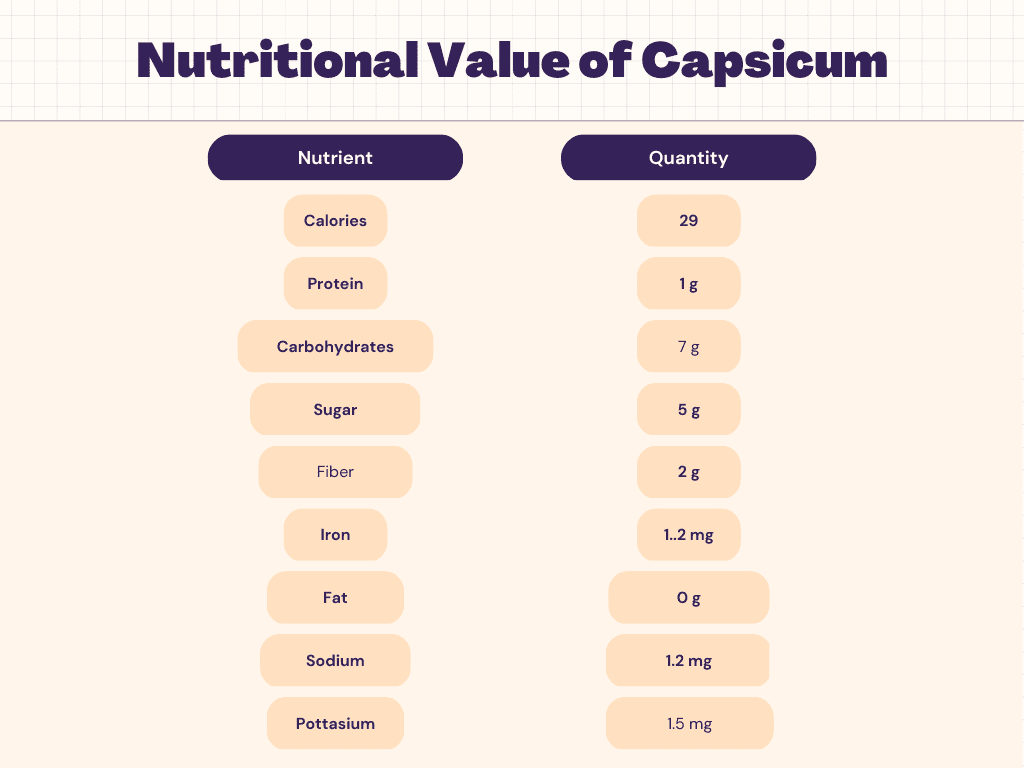Capsicum is a type of herb sometimes referred to as red pepper or chili pepper. For the relief of arthritis pain and other diseases, its fruit is frequently rubbed on the skin. A substance known as capsaicin can be found in the fruit of the capsicum plant. Pepper sprays for self-defense are made in this way. Capsicum is frequently used to treat painful conditions including nerve pain. There are numerous additional uses for it as well, such as disorders of the heart and blood vessels, issues with digestion, and many others, however many of these don’t have strong scientific backing.
Nutritional Value of Capsicum

Nutritional Facts of Capsicum
Carbs
Carbohydrates make up the majority of the calories in bell peppers, with 3.5 ounces (100 grams) containing 6 grams of them. The majority of the carbohydrates are sugars, like fructose and glucose, which give ripe bell peppers their sweet flavor. Bell peppers have 2% of their fresh weight in fiber, which is a negligible quantity. They are a very good fiber source when comparing calories to calories.
Health Benefits Of Capsicum
- Helps in the prevention of Anemia – Low levels of iron in the body are frequently the cause of the disorder anemia. The condition’s reduction in blood oxygen levels is one of its characteristics. As a result, the majority of anemic individuals experience vague feelings of fatigue and lethargy.
- Helps Reducing Stress – Capsicum is a rich source of magnesium and vitamin B6. Studies show that these two vitamins protect against panic episodes, support nerve health, and reduce anxiety.
- Helps boost immunity – Vitamin C content in capsicum is very high. The greatest vitamin C is found in red capsicum, which is present in most fruits and vegetables. Vitamin C-rich foods are good for the immune system.
- Helps in the prevention of Cancer – It has been demonstrated that the antioxidant and anti-inflammatory properties of capsicum help to prevent several malignancies.
- Helps with Eye Health – The health of your eyes will benefit greatly from capsicum. Lutein and zeaxanthin, two carotenoids that shield your retina from oxidative damage, are abundant in capsicums. Free radicals can grow in our eyes, which are immediately exposed to oxygen and light, and harm their cells.
- Helps in Weight Loss – Capsicum might be an excellent food to include in your daily diet if you’re trying to reduce weight. Vegetable can help with weight loss and speed up metabolism because it is high in fiber and water. Capsicum is simple to include in daily meals. Follow our Weight Loss Plans.
Weight Loss Benefits of Capsicum
The nutritional profile of capsicum is very good for weight loss. In addition to being high in vitamins and minerals, capsicums are also strong in fiber and water content. The secret to managing your weight is to choose nutrient-dense, high-fiber fruits, and vegetables. Fiber and water also give off the satiety-inducing sensation and are powerful appetite suppressants that help people avoid overeating.
Vitamins & Minerals in Capsicum
In addition to having high fiber content, capsicum also has significant levels of micronutrients that are very good for the health of your body. The vitamin C content of capsicum, which makes up about 213% of your daily recommended allowance, is quite high. Numerous bodily functions, such as immune system operation, wound healing, and collagen formation, depend on vitamin C. In addition to being high in vitamin C, capsicum also contains a significant amount of vitamin A, 93% of your daily requirements.
The Bottom Line
The major components of bell peppers are water and carbohydrates. The majority of carbohydrates are sugars like fructose and glucose. Bell peppers are a respectable source of fiber as well. One bell pepper can provide up to 169% of the recommended daily intake (RDI) for vitamin C. Vitamin K1, vitamin E, vitamin A, folate, and potassium are additional vitamins and minerals found in bell peppers.
Numerous beneficial antioxidants, such as capsanthin, violaxanthin, lutein, quercetin, and luteolin, are present in bell peppers. Numerous health advantages are connected to these plant components.
Bell peppers might have a variety of health advantages, just like other fruits and vegetables. Improved eye health and a decreased risk of anemia are a couple of these.
FAQs
How much Capsicum is too much Capsicum?
Estimates of the amount of capsaicin that might produce toxicity and perhaps fatal side effects in humans are based on research that investigated the substance’s toxicity in animals. For an individual weighing 150 pounds, it is predicted to be between 12 and 13 grams.
Should I eat Capsicum before or after exercise?
You should ideally eat about 30-45 minutes before working out. If a full meal seems overwhelming at first, be sure to eat a little snack first. Then, after working out, make sure to thoroughly replenish your supplies.
Is it good to consume Capsicum daily?
Capsicum might be an excellent food to include in your daily diet if you’re trying to reduce weight. Vegetable can help with weight loss and speed up metabolism because it is high in fiber and water. Capsicum is simple to include in daily meals.









